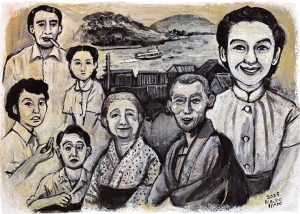Hiroshima and Film, Part 8: Yukihiro Morigaki―Film director and videographer
Feb. 15, 2025
“Tokyo Monogatari” (‘Tokyo Story’; Released in 1953) Director: Yasujiro Ozu
Expressing the universality of family without exaggeration
It was in my junior year of college when I first saw this movie directed by Yasujiro Ozu in the college library. It was a shocking experience for me, someone who had only enjoyed Hollywood movies through frequent visits to the video rental store until high school. The first movie I saw was “Tokyo Monogatari” (‘Tokyo Story’), the most well-known of Ozu’s works in the world.
Unlike Hollywood movies, which are staged in a showy manner, the story unfolds calmly, but for some reason my eyes were glued to it, as if I were appreciating a work of art, like a sculpture. The characters speak in a distinctive, flat tone that is unique to Ozu’s work, and the camera angle, which I had never seen before, shot from the floor, was the cinema experience that proved to be my turning point.
Mr. Ozu does not move the camera; instead, the actors perform within a frame that is at a completely calculated angle. Every scene is just beautiful and makes me want to keep watching, even though it is a monochrome film.
The universality of the family, common to the world, is the theme expressed in his film. There is no evil in it, but the family is confronted with issues that cannot be helped, such as the differences in values and meaning of life between generations. The way these challenges are posed, however, is not unpleasant. Because there is no exaggeration, an air of authenticity is created, and social issues are brought home to the audience beyond the screen.
There are no other films of that time that are similar in world view and production to his, and I think that is the reason why only Mr. Ozu could make such films. I found myself with a 180-degree change in the way I look at and think about movies after encountering his work, like changing the movies I watch from Hollywood to Europe. It is not too much to say that his works have shaped my values as they are today.
I admire and respect director Ozu and have followed in his footsteps. The first short film I made won second prize in the short film competition of the Ozu Yasujiro Kinen/Tadeshina Kogen Film Festival. I stayed at “Chigasaki-kan,” Mr. Ozu’s regular hotel in Chigasaki, Kanagawa Prefecture, and spent all my time writing. In 2019, I ended up opening an inn called “Kujira Bekkan” as a manager in Onomichi, Hiroshima Prefecture, which is the location of “Tokyo Story.”
It was the spring of 2018, when Cinema Onomichi screened my debut film “Ojichan, Shinjattatte” (‘Goodbye, Grandpa’) and I visited Onomichi for the first time in a long time. The town was just so beautiful, with the smell of the sea, a sea breeze, and the houses standing side by side on the hill in a dignified manner, as if it was the scenery of an old European town. I remember feeling very sympathetic to why he chose Onomichi as the location. I was fascinated by the scenery of Onomichi, which makes a good picture no matter where I shot, and felt I wanted to visit the place regularly.
I will push on with my work, wishing Mr. Ozu could have seen my films.
Profile
Yukihiro Morigaki
Born in in 1983 in Saeki Ward, Hiroshima. Mr. Morigaki began making documentaries while a student at Hiroshima Institute of Technology. After working in a commercial production company and in a group of videographers, he started his own business and founded a group of creators called “Kujira.” Works directed by Mr. Morigaki include “Sankaku Mado no Sotogawa wa Yoru” (‘The Night Beyond the Tricornered Window’) and “Ai ni Ranbou” (‘Rude to Love’).
Hato
Born in Otake City in 1981. Her real name is Keiko Hata. She creates a wide range of formative arts, including painting, graphic design, stop-motion animation, and theatrical art.
Information on the film
Japan / 135 min. / Monochrome / Shochiku, Co., Ltd.
[Screenplay] Kogo Noda, Yasujiro Ozu
[Cinematography] Yuharu Atsuta
[Lighting] Itsuo Takashita
[Art] Tatsuo Hamada
[Recording] Yoshisaburo Senoo
[Music] Takanobu Saito
[Performer] Setsuko Hara, Chishu Ryu, Chieko Higashiyama, So Yamamura, Kuniko
Miyake, Haruko Sugimura, Kyoko Kagawa, Shiro Osaka
****
In this series, the Chugoku Shimbun asks a movie-loving writer to choose a movie related to Hiroshima and to share highlights and memories of the selected movie. We will publish them from time to time.
(Originally published on February 15, 2025)








